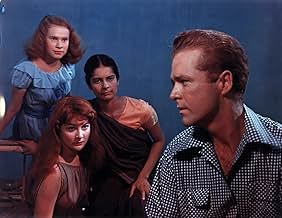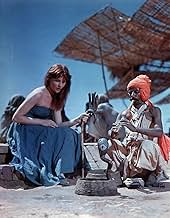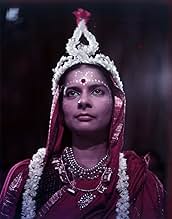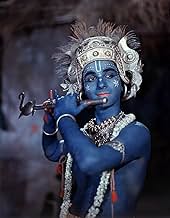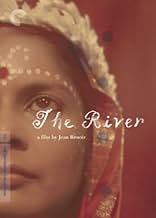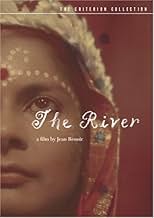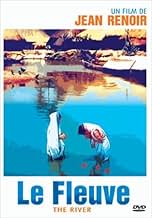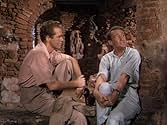IMDb RATING
7.4/10
7.2K
YOUR RATING
The growing pains of three young women contrast with the immutability of the holy Bengal River, around which their daily lives unfold.The growing pains of three young women contrast with the immutability of the holy Bengal River, around which their daily lives unfold.The growing pains of three young women contrast with the immutability of the holy Bengal River, around which their daily lives unfold.
- Nominated for 2 BAFTA Awards
- 3 wins & 4 nominations total
June Tripp
- Narrator
- (voice)
- (as June Hillman)
Nimai Barik
- Kanu
- (uncredited)
Richard R. Foster
- Bogey
- (uncredited)
Jane Harris
- Muffie
- (uncredited)
Jennifer Harris
- Mouse
- (uncredited)
Trilak Jetley
- Anil
- (uncredited)
Sajjan Singh
- Ram Singh - The Gateman
- (uncredited)
Penelope Wilkinson
- Elizabeth
- (uncredited)
Cecilia Wood
- Victoria
- (uncredited)
Featured reviews
10jasonb84
This is a little known film, but well worth watching if you're lucky enough to find it on Video or TV. The director Jean Renoir is the son of the French Impressionist Painter Pierre Auguste Renoir ( the cinematographer Claude Renoir is Jean's nephew ) and the family talent shines throughout this film, which is beautifully shot. Whether showing the amazing landscape of India and the river itself, the colours and intricacies of the many Indian festivals, or even a close up of Valerie's face as she gazes at Captain John, every frame displays grace, beauty and style that film rarely captures.
The plot itself, how a troubled outsider affects three teenaged girls, is a simple tale, and all the more powerful for it. We've all had a crush, and know the river of emotions that are awakened by one. Each of the three girls, the irrepressible and dramatic Valerie, the talented but awkward Harriet, and the stoic Melanie ( who despite schooling in the West is somehow more Indian in nature than her friends who've been brought up in India ) vie for Captain John's affections in their own way.
However, the real love of this film is India itself - it's fascinating people, beliefs, festivals, and the constant River that runs through them all. It's a slow paced film, not in a hurry to get to any kind of conclusion, and you are immersed in the country, and what it's like to live there. Like relaxing on one of the many river boats, as its floats gently downstream, the film meanders along, showing us different scenes along the way, from the local postman's route to the house gates to the son's fascination with Cobras, with the story always moving on, though always interwoven with more day to day life. This brings a familiar reality to the film, it doesn't just skip moments that might not immediately concern the main characters - like life, other events happen, and they have their place in this film too.
Actually getting to watch this film will be hard, it's not well known ( and not even considered one of Renoir's best ), but if you ever come home one night, flick on the TV, and see this starting, then get comfortable, and enjoy a lovingly made film about a country and the people, both native and foreigners, who live there.
The plot itself, how a troubled outsider affects three teenaged girls, is a simple tale, and all the more powerful for it. We've all had a crush, and know the river of emotions that are awakened by one. Each of the three girls, the irrepressible and dramatic Valerie, the talented but awkward Harriet, and the stoic Melanie ( who despite schooling in the West is somehow more Indian in nature than her friends who've been brought up in India ) vie for Captain John's affections in their own way.
However, the real love of this film is India itself - it's fascinating people, beliefs, festivals, and the constant River that runs through them all. It's a slow paced film, not in a hurry to get to any kind of conclusion, and you are immersed in the country, and what it's like to live there. Like relaxing on one of the many river boats, as its floats gently downstream, the film meanders along, showing us different scenes along the way, from the local postman's route to the house gates to the son's fascination with Cobras, with the story always moving on, though always interwoven with more day to day life. This brings a familiar reality to the film, it doesn't just skip moments that might not immediately concern the main characters - like life, other events happen, and they have their place in this film too.
Actually getting to watch this film will be hard, it's not well known ( and not even considered one of Renoir's best ), but if you ever come home one night, flick on the TV, and see this starting, then get comfortable, and enjoy a lovingly made film about a country and the people, both native and foreigners, who live there.
It's difficult to argue with Gabridl's remarks about the film - and I'm sure Renoir would have pleaded guilty as charged. Of not making a civics lesson. So, if that's what you want out of art, then this is not the film for you. At all. You will learn nothing of Indian politics, the "exoticism" will drive you mad, and you'd do better to go back and re-read Said's "Orientalism," as Gabridl suggests.
Renoir went to India, and made a film from the perspective of an entranced outsider looking in, creating his own, personalized world - not India, but Renoir's world, where everything is transitory, including beauty and death, and where every sight and sound becomes that much more precious.
I am glad that we have come so far since I've been a kid, when so many ideas and prejudices carried over from the colonial era were still floating through the air, and it's true that no one except that most naive among us would make a film like THE RIVER today. But Renoir was alive in 1950, not now, and he made his film for his time, and that time attaches itself to the film, just like it does to every artwork. I doubt that even Gabridl would suggest that it was the work of a craven exploiter of the masses, and that its "faults" are not the faults of a corrupt man, but of a generous and compassionate one. It's one of the most generous films I know of.
Finally, I would add that while this is a film made by a westerner for other westerners, it was certainly inspirational to Satyajit Ray, who worked as Renoir's assistant.
Renoir went to India, and made a film from the perspective of an entranced outsider looking in, creating his own, personalized world - not India, but Renoir's world, where everything is transitory, including beauty and death, and where every sight and sound becomes that much more precious.
I am glad that we have come so far since I've been a kid, when so many ideas and prejudices carried over from the colonial era were still floating through the air, and it's true that no one except that most naive among us would make a film like THE RIVER today. But Renoir was alive in 1950, not now, and he made his film for his time, and that time attaches itself to the film, just like it does to every artwork. I doubt that even Gabridl would suggest that it was the work of a craven exploiter of the masses, and that its "faults" are not the faults of a corrupt man, but of a generous and compassionate one. It's one of the most generous films I know of.
Finally, I would add that while this is a film made by a westerner for other westerners, it was certainly inspirational to Satyajit Ray, who worked as Renoir's assistant.
Jean Renoir embraces Technicolor for the first time in his adaptation of Rumer Godden's coming- of-age novel THE RIVER, with the latter collaborating on the screenplay. The story takes place in Bengal, India, a teenage girl named Harriet (Walters) is the eldest child of a middle-class British family living near the riverbank of Ganges, her father (an one-eyed Knight) runs a jute mill, and her mother (Swinburne) is expecting a child no. 7.
It is a carefree scenario, growing up in the natural inculcation of an exotically profound Hindu culture while carrying on an genteel upbringing, sometimes, it conspires to be a false or at least parochial impression of the land and its people, which doesn't take up too much space in the story-line, the only native Indian who has a speaking part is Nan (Mukerjee), the family's convivial but gossipy nanny, and the rest sustains as an ethnic curiosity to meet the Westerners' eyes, although beguilingly and entrancingly so, after all, what we are allowed to watch is the smugly colonial tip of the Indian iceberg.
The plot revolves around Harriet's budding affection towards the guest of their neighbor Mr. John (Shields), an one-legged American Captain John (Breen), who takes his time in lolling on a foreign land, to find some peace with his battlefield past and physical disability, look for a new resolution for life. As John is the only eligible white young man on the market, to her chagrin, a besotted, but fairly plain-looking Harriet has a losing game against her rival, the maturer and more zaftig Valerie (Corri), by the way, a British girl too is also her best friend. And throughout this picturesque film, it is Harriet's voice-over that guides viewers traversing her prepubescent triviality (poems, indeed), to listen to her inner voice, to sympathize her unrequited love, to find empathy in this garden-variety tale.
Wielded as an emotional clincher, a tragic incident materializes as one downside of having a brood of many caused by adult negligence, but here also emanates a disquieting undertow to pinpoint the virulence of a foreign society with a local boy standing by as an unwary abetter. And a cheesy solution to get it over is taking the pro-procreation flag, babies are being borne all the time.
The cast is mixed with adult professionals and amateur players, but comes off barely adequate, a major gripe is the narrative ellipsis in the story of Melanie (Radha), the mixed-race daughter of Mr. John, who stands out (there is not much competition though) with a massively pleasurable Ganesha-courting dancing sequence, but whose dislike of herself, waffling identity never been considerably mapped out as a pre-eminent counterpoint of Harriet's more orthodox background.
So, all above sounds like a pejorative critique against a film who has earned a hallowed reputation since its genesis, yet, it is as plain as the nose on one's face, the picture's eye-catching glamour and aural accompaniments are undeniably supreme, technologically speaking. And it is smart enough for Mr. Renoir to treat it as a philosophical prose other than a heady narration of banal proceedings, only a 60-odd-year later, its allure fades away slightly due to the original novel's awkward stance on a colonized land and Renoir's condoning deference.
It is a carefree scenario, growing up in the natural inculcation of an exotically profound Hindu culture while carrying on an genteel upbringing, sometimes, it conspires to be a false or at least parochial impression of the land and its people, which doesn't take up too much space in the story-line, the only native Indian who has a speaking part is Nan (Mukerjee), the family's convivial but gossipy nanny, and the rest sustains as an ethnic curiosity to meet the Westerners' eyes, although beguilingly and entrancingly so, after all, what we are allowed to watch is the smugly colonial tip of the Indian iceberg.
The plot revolves around Harriet's budding affection towards the guest of their neighbor Mr. John (Shields), an one-legged American Captain John (Breen), who takes his time in lolling on a foreign land, to find some peace with his battlefield past and physical disability, look for a new resolution for life. As John is the only eligible white young man on the market, to her chagrin, a besotted, but fairly plain-looking Harriet has a losing game against her rival, the maturer and more zaftig Valerie (Corri), by the way, a British girl too is also her best friend. And throughout this picturesque film, it is Harriet's voice-over that guides viewers traversing her prepubescent triviality (poems, indeed), to listen to her inner voice, to sympathize her unrequited love, to find empathy in this garden-variety tale.
Wielded as an emotional clincher, a tragic incident materializes as one downside of having a brood of many caused by adult negligence, but here also emanates a disquieting undertow to pinpoint the virulence of a foreign society with a local boy standing by as an unwary abetter. And a cheesy solution to get it over is taking the pro-procreation flag, babies are being borne all the time.
The cast is mixed with adult professionals and amateur players, but comes off barely adequate, a major gripe is the narrative ellipsis in the story of Melanie (Radha), the mixed-race daughter of Mr. John, who stands out (there is not much competition though) with a massively pleasurable Ganesha-courting dancing sequence, but whose dislike of herself, waffling identity never been considerably mapped out as a pre-eminent counterpoint of Harriet's more orthodox background.
So, all above sounds like a pejorative critique against a film who has earned a hallowed reputation since its genesis, yet, it is as plain as the nose on one's face, the picture's eye-catching glamour and aural accompaniments are undeniably supreme, technologically speaking. And it is smart enough for Mr. Renoir to treat it as a philosophical prose other than a heady narration of banal proceedings, only a 60-odd-year later, its allure fades away slightly due to the original novel's awkward stance on a colonized land and Renoir's condoning deference.
10Fesch
This is one of those rare films which give you the impression after viewing it that you have truly lived and shared the lives of its characters (not just 'two people received that kiss', as they say in the film, but everyone who's watching the movie).
You became part of that river as the film progresses, it is perhaps the picture which has described the passage of time better than any other. It is life, running within its waters, that catches your soul, which melts with the river and the film and your memory...
I think it is the only movie that made me run to a bookstore to buy the book it was based on. Rumer Godden's work is beautiful indeed, but the film is far better for me.
Highly recommended!
You became part of that river as the film progresses, it is perhaps the picture which has described the passage of time better than any other. It is life, running within its waters, that catches your soul, which melts with the river and the film and your memory...
I think it is the only movie that made me run to a bookstore to buy the book it was based on. Rumer Godden's work is beautiful indeed, but the film is far better for me.
Highly recommended!
Unlike many western movies i have seen that portrays Indians as if they were some nomadic people who are far from culture and sophistication, this film understands and illustrates the exact philosophy behind every deed that is performed by the Indians.
And also i wonder why can't so many great directors inspire from a film like this to understand that the true culture lies in philosophy and not in their race or color. I suppose it is easy to stick to stereotypes rather than educating through movies.
Therefore, it is not diversity for namesake that is important, but proper the depiction of one's understanding towards the diversity.
And also i wonder why can't so many great directors inspire from a film like this to understand that the true culture lies in philosophy and not in their race or color. I suppose it is easy to stick to stereotypes rather than educating through movies.
Therefore, it is not diversity for namesake that is important, but proper the depiction of one's understanding towards the diversity.
Did you know
- TriviaThomas E. Breen, who plays Capt. John, was really missing one leg like his character.
- Goofs(at around 36 mins) A cigarette appears from nowhere.
- ConnectionsFeatured in Loin (2001)
- How long is The River?Powered by Alexa
Details
Box office
- Gross worldwide
- $53,357
- Runtime
- 1h 39m(99 min)
- Aspect ratio
- 1.37 : 1
Contribute to this page
Suggest an edit or add missing content


